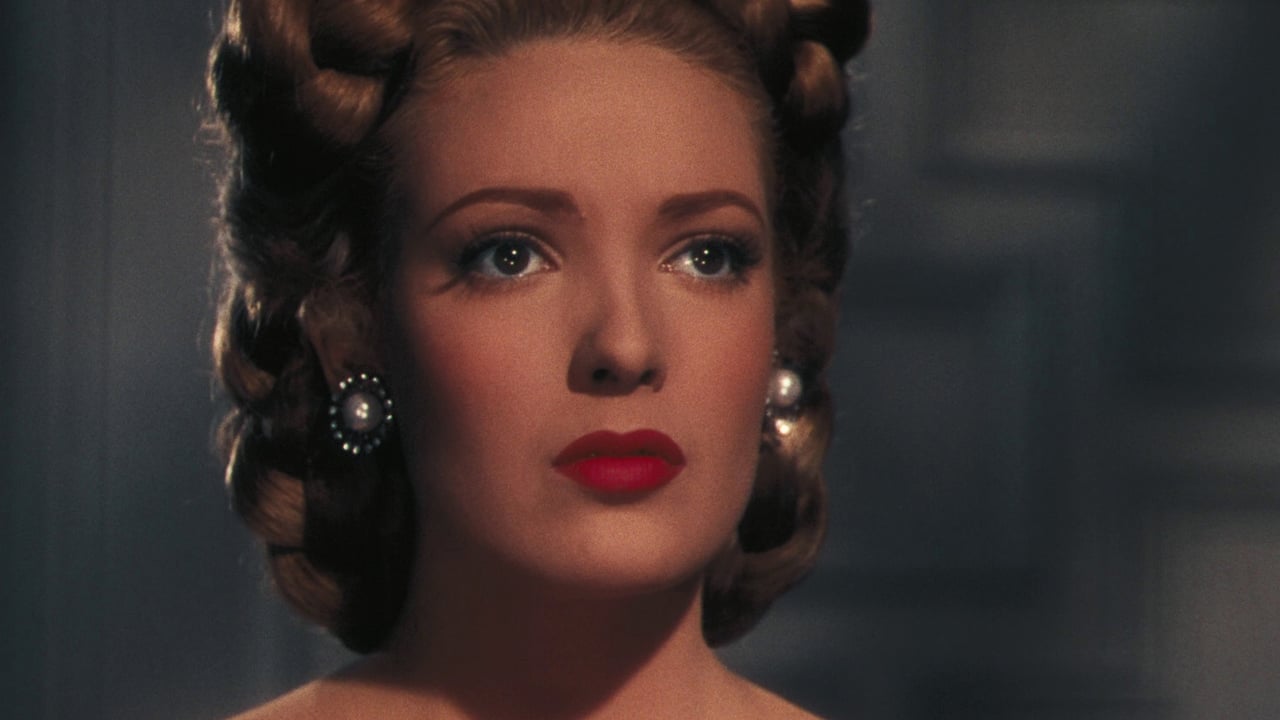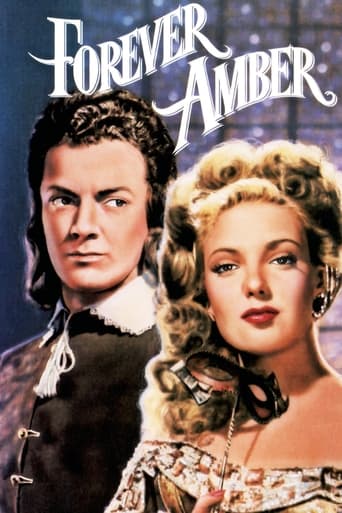CheerupSilver
Very Cool!!!
BroadcastChic
Excellent, a Must See
Reptileenbu
Did you people see the same film I saw?
Glimmerubro
It is not deep, but it is fun to watch. It does have a bit more of an edge to it than other similar films.
James Hitchcock
Kathleen Winsor's novel is frequently referred to as a "bodice ripper", a description often used for mildly salacious historical romances, generally featuring passionate, strong-willed heroines and dashing, tempestuous heroes. Although the Catholic League of Decency saw to it that much of the salaciousness went missing between book and screen (Puritanism in America is clearly not an exclusively Protestant phenomenon), the film version still preserves a healthy ration of tempestuous passion. The heroine is Amber St Clair, a beautiful farmer's daughter in the reign of Charles II, who becomes an actress, a fashionable London lady and eventually the mistress of the King himself. The decade immediately following the Restoration was one of the most dramatic in English history, and the plot of "Forever Amber" milks that drama to the full, featuring plague, fire, a highwayman, a duel, and the heroine's numerous love affairs.I would agree with the reviewer who pointed out the similarity of the plot to that of "Gone with the Wind", with Amber as a seventeenth-century Scarlett O'Hara and her lover Lord Bruce Carlton as the Rhett Butler figure, the one man whom the heroine truly loves but eventually loses. Amber's obsession with Bruce brings out the best in her character- she courageously and selflessly nurses him through the plague- but also the worst, seen in her unsuccessful attempts to destroy his relationship with his new American wife Corinne. It also ruins her chances of happiness with any other man, leading to the deaths of her elderly husband and a fiancé (killed in a duel) and to the loss of the King's favour. (He cannot bear the idea that his mistresses might have feelings for other men).The ending of the film, in which Amber loses her young son to Bruce and Corinne, seems to have been added by the film-makers to placate the League of Decency, showing her being punished for her sins. It also provides the pretext for a display of American patriotism, with the implication that the boy will enjoy a morally purer life in the New World away from the aristocratic decadence of the Old. This contrast between the innocence and purity of Young America and the cynicism and corruption of Old Europe is, of course, a common theme in American popular culture, but I was rather surprised to find it pushed as far back into history as the good old colonial days of the sixteen-sixties. As young Bruce junior was destined to become the master of a Virginia plantation built on slave labour, I doubt if his new life in the colonies was any morally purer than the life he might have led as an English aristocrat and the son of the King's mistress.As a historical melodrama, "Forever Amber" is not in the same class as "Gone with the Wind". This is partly because of the look of the film- the colour is rather dark and muddy- but mostly because the leading actors could not bring to their roles the same depth that Vivien Leigh and Clark Gable brought to Scarlett O'Hara and Rhett Butler. I found it ironic that Peggy Cummins was sacked from the part of Amber because she was not "worldly enough", as I felt that Linda Darnell also came across as too young and innocent, particularly in the later scenes where Amber has matured into a scheming courtesan. It perhaps might have been a better film if the slightly older and more experienced Susan Hayward (who was also considered) had got the part. As for Cornell Wilde, he made a rather uncharismatic Bruce, and I found it difficult to conceive of him as the great love of Amber's life. The other characters do not make much impression, with the exception of George Sanders' King Charles. He was perhaps slightly too old for the part (Charles was only thirty at the time of the Restoration) but his cynical, saturnine interpretation of the role was probably closer to the real Charles than the dashing "merry monarch" of the popular imagination. Him apart, however, this film is a largely forgettable historical melodrama. 5/10
perfect1-1
This movie has always been a favorite of mine, BUT I hadn't seen it in over 20 years... so that should say something about my maturity level. Recently, I viewed it two different times. Each time I got something new from it, but it was still hard to follow and boring.My main objective here is in trying to find out where they got the beautiful dogs that King Charles had. They are King Charles Spaniels... as they are named after the king. However, for 1947 I am amazed at how beautiful these dogs looked. Truthfully, these dogs were the highlight of my purpose for viewing this movie. Any comments about the background of these dogs would be appreciated.
jdavij2003
I just wanted to say that for an old movie, it was okay. I read the book before I saw the movie, and usually that is cause for nitpicking. I think that the main problems I had with the movie were that it seemed to jump around a lot and I don't think I would have known what was going on if I hadn't read the book. Also, one comment mentioned that the ending could have led to a sequel, which I guess is true. But, in the book, Amber lets Bruce and Corrine take little Bruce, and then Amber's enemies tell her that Corrine has died, so Amber takes off to America to be with him. The problem is, Corrine is alive, Amber's enemies simply wanted to be rid of her. I really think it would be great if the movie were remade today, with all the details. I would pay to see it!
countryway_48864
I had not seen Forever Amber since I saw it in a theater as a young girl and was completely captivated by the intrigue and the flash and dash of it all.Seeing it now as a MUCH older woman, I see the holes, mostly in the lighting which is quite dim even when it should be bright. Perhaps the set designer was trying to give the effect of period lighting.I was struck by how much the story follows the bare-bones of Gone With The Wind, in particular the way it ends and the glamorous and enigmatic Baron Carlton- Cornell Wilde, walk away with the child while Amber watches from the window. A perfect opening for the sequel that never came.Forever Amber doesn't even pretend to be a GREAT film, but it is a good one with good acting and some wonderful touches, especially George Sanders' terrific "Snidley Whiplash" aka James II. as he calls his brace of King Charles spaniels "children".Linda Darnell is lovely but not as accomplished an actress as Vivian Leigh (or as beautiful). Cornell Wilde is NOT Clark Gable-but who was? Still, both manager to give satisfactory performances.Wilde's best scenes are with the child who looks very much like him. There is a warmth and humor about Wilde when he is interacting with the child that is charming. His Baron Carlton is aloof and something of a snob with everyone else. He is aware of his station in life and unable to break his code of behavior even for Amber. I have no doubt he likes her, but I don't think he ever loved her in the same way she loved him. He never really seems to empathize with her struggles, but is genuinely grateful to her for saving his life and delighted with his young son. He is an puzzle wrapped in a conundrum.Amber is all surface. She has the depth of a parking-lot puddle and I find myself wishing Maureen O'Hara had been cast. Then REAL sparks would fly. In Darnell's Amber we get a smudge-pot. Oh well.The glimpses of the court and old London, the plague and the fire are interesting and, in general the film is FUN.My one REAL regret is that we never see enough of Wilde fencing. He was a National fencing champion and on the 1936 Olympic Fencing team, but his fencing scene in Amber is shot through fog so dense you can hardly see him. That's a shame!!Enjoy that barn-burner for what it is, not what it could have been!

